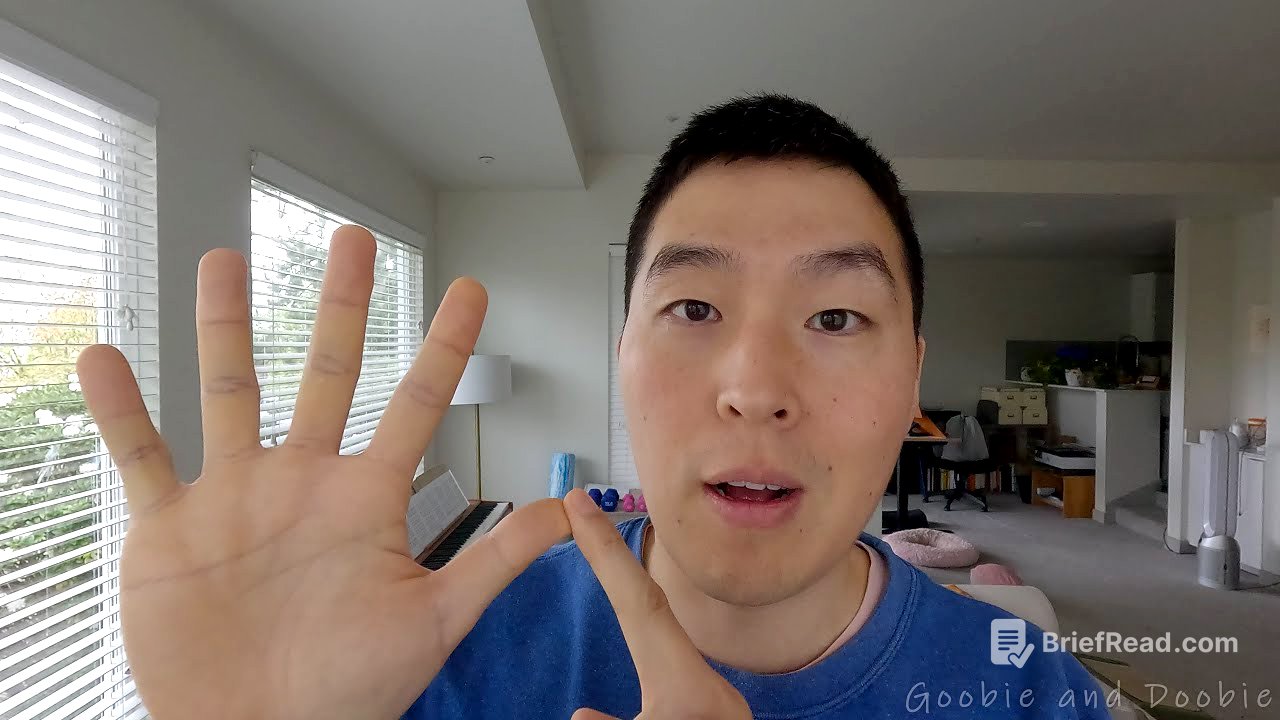TLDR;
This video discusses the concept of success, arguing that it's not about trying hard, but rather about deliberate consistency, randomness, intuition, and reflection. The speaker shares personal anecdotes and examples from their life, including experiences with multiple-choice exams, video games, and creating content for YouTube, to illustrate these points. The key takeaways include:
- Success is achieved through consistent effort combined with strategic variation and thoughtful analysis.
- Trying too hard can be counterproductive; a more relaxed and intuitive approach often yields better results.
- Understanding and adapting to the dynamics of systems, like the YouTube algorithm, can be a fun and rewarding challenge.
What I Mean By Success [0:00]
The speaker starts by celebrating the channel's one-year anniversary and expressing gratitude to the viewers. They clarify that their definition of success isn't tied to conventional markers like wealth or material possessions, dismissing the "American dream" as largely unattainable. Instead, they define success as achieving a goal or task, whether simple like doing dishes or complex like mastering a skill or creating a YouTube channel. They also mention specific examples like becoming a neurosurgeon or acing multiple-choice exams, setting the stage for discussing strategies to achieve these diverse goals.
What Works For Me Is Applicable For Anybody [4:30]
The speaker asserts that their approach to success is universally applicable, despite past experiences where colleagues dismissed their methods as unique to them. They recount an incident where, after excelling on the neurosurgery written boards, a colleague discredited their advice, claiming it wouldn't work for others. Undeterred, the speaker insists on sharing their insights, believing that consistency, balanced with randomness, deliberateness, intuition, and reflection, is key to achieving goals.
The Harder I Try The Worse The Outcome Is [6:48]
The speaker challenges the common belief that hard work guarantees success, arguing that excessive effort can actually hinder progress. They introduce the idea that a more effective approach involves consistency, randomness, intuition, and reflection. The speaker emphasizes that "deliberate consistency mixed with some randomness intuition and reflection" is the key to success.
Learning Through Deliberate Consistency [8:46]
The speaker explains how the brain learns and improves through consistent practice, using the example of throwing darts. They describe how the brain uses feedback mechanisms, involving the cerebellum and reward system (dopamine release), to adjust movements and improve accuracy. Consistent practice leads to the development of "muscle memory" (actually refined neural pathways), making the task more automatic and less reliant on conscious thought. The speaker contrasts this with "trying hard," which involves excessive effort and stress, advocating instead for simply "doing it" repeatedly without undue pressure.
Randomness Mixed With Intuition And Reflection [14:00]
The speaker emphasizes that consistency alone isn't enough; one must also incorporate randomness, intuition, and reflection to improve. They explain that even when trying to repeat an action exactly, slight variations occur due to the uniqueness of each moment. Consciously introducing variability, guided by intuition, can lead to breakthroughs. The speaker cautions that not all changes are beneficial, and it's important to trust one's instincts while also reflecting on the results to adapt and refine the approach.
How To Ace Multiple Choice Exams [20:00]
The speaker provides specific strategies for excelling on multiple-choice exams. They argue that these exams are easier than essay questions because the correct answer is already provided. The key is to practice with numerous questions and immediately review the answers to understand the question writer's logic. By eliminating obviously wrong answers and identifying patterns in the questions, one can increase their odds of selecting the correct answer. The speaker advises against spending too much time reading textbooks, instead recommending focusing on practicing test questions to learn the material effectively.
Getting Good At A Videogame [29:10]
The speaker uses video games as another example to illustrate their principles of success. They share their experiences with the game PUBG (Player Unknown Battlegrounds), emphasizing that trying too hard can be counterproductive. They contrast using a sniper rifle, which requires precise aim and timing, with using a machine gun, which allows for more attempts and adjustments. The speaker highlights the importance of consistency, adaptation, and reflection in improving one's gameplay.
Playing The YouTube Algorithm Game [33:55]
The speaker discusses their experience creating content for YouTube, noting that the videos requiring the least effort often perform the best. They reflect on the types of videos that resonate with their audience and how they've adapted their content strategy over time. The speaker mentions experimenting with different video formats, equipment, and editing styles, ultimately finding that simplicity and authenticity tend to yield the best results. They describe the process of understanding and adapting to the YouTube algorithm as an "entertaining game."
Why I Like Making These Videos [46:16]
The speaker explains their motivations for creating videos, emphasizing that it's primarily for their own enjoyment and learning. They clarify that their goal is not to "help people" directly, but rather to explore their own thoughts and interests. The speaker acknowledges the potential for viewers to benefit from their content but stresses that their primary focus is on personal growth and the challenge of understanding the YouTube algorithm.
Conclusion [48:00]
The speaker summarizes the main points of the video, reiterating that success is not about trying hard but about deliberate consistency mixed with randomness, intuition, and reflection. They conclude by wishing the viewers a good day or evening.









